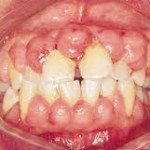 Drug induced gingival hyperplasia is one of the common causes of gingival enlargement. Â
Drug induced gingival hyperplasia is one of the common causes of gingival enlargement. Â
There are three types of drugs highly associated with gingival hyperplasia/enlargement :
1) Antiepileptic drug (Phenytoin)
 2) Immunosuppressive drug (cyclosporine) and 3) calcium-channel blocking drug (nifedipine).
Phenytoin is usually prescribed for the treatment of seizures where as calcium channel blocking drugs are used to treat heart diseases, angina and hypertension.
 The incidence of gingival enlargement is lower in patients who are taking cyclosporine compared to patients who are on phenytoin (Approximately 50 % of patients have gingival overgrowth). However, it can be very severe (covers the entire surface of teeth) when gingival enlargement occurs in patients who are taking cyclosporine.Â
DRUG INDUCED GINGIVAL HYPERPLASIA:
-Â Â Â Â Â Â Â Â Â Often affect the gingival on the labial (front) surface of the anterior teeth.
-Â Â Â Â Â Â Â Â Â Gingival swelling is pink, firm and lobulated especially in cyclosporine induced gingival enlargement.
-Â Â Â Â Â Â Â Â Â Gingival swelling is made up mainly of fibrous tissue.
-Â Â Â Â Â Â Â Â Â Gingival swelling can become soft, inflamed, when provoked especially by dental plaque.
-Â Â Â Â Â Â Â Â Â Gingival enlargement tends to be more severe in areas where plaque accumulates such as at the edge of dental fillings and around your orthodontic appliance.
-Â Â Â Â Â Â Â Â Â In severe condition, gingival hyperplasia can cover the entire surface of your teeth. The enlargement can even extend into your gingival sulcus.
-Â Â Â Â Â Â Â Â Â Size of swelling does not appear to be related to the dosage of the drug.
-Â Â Â Â Â Â Â Â Â The real relationship between drug usage and gingival enlargement is not clear. However, it is understood that the etiology of drug induced gingival overgrowth is multi factorial. It can be due to dental plaque or the usage of drug. Dental plaque enhances the activity of fibroblasts hence stimulates the production of fibrous tissue.(Fibroblast is a type of cell which is responsible for the gingival enlargement)
Treatment and management of drug induced gingival hyperplasia.
- Â Â Â Â Â Plaque removal
As we have mentioned earlier, dental plaque can worsen your gingival overgrowth condition.  The best way to prevent and reduce your gingival swelling if you are taking any of the above drugs is to brush well and remove plaque effectively. Mild gingival enlargement may respond professional scaling and maintenance of good oral hygiene. Click here to read more on how to remove dental plaque effectively. http://www.intelligentdental.com/2011/09/10/how-does-plaque-affect-the-teeth/
2.      Change of drug. Discuss with your physician whether it is possible to reduce the dosage of the drug or change to another alternative drug. Thus it is important that you inform the dentist regarding any drugs that you are taking so that he can identify the cause of your gingival overgrowth.  If changing of drug is not possible, the dental practitioner should inform his/her patient about it and the only treatment available for you is to maintain good oral hygiene and undergo professional scaling treatment to minimize plaque accumulation.
3.      Local removal of gingival overgrowth can be carried out by periodontal surgery procedures such as gingivectomy.  However, recurrence of gingival overgrowth (reduce by maintenance of good oral hygiene) is very common after surgery.Â
4.      Here are some brief explanations of how gingivectomy is performed.Â
1.      The periodontal specialist will mark the apical limit of your periodontal pocket (the deepest part of your periodontal pocket) by using a special instrument.
2.      Then, he will perform a continuous incision using a special scalpel/knife. This incision will be made 45 degrees to the base of your periodontal pocket. Excess tissue can be removed using a curette or scaler and hence a satisfactory gingival contour can be produced.
3.      After the surgery, you will be asked to avoid : (i) eating or drinking for one hour.
                                                                                                       (ii) taking hot drinks for the 1st day
                                                                                                       (iii) smoking during the healing process
                                                                                                        (iv) touching/playing the surgical site with your tongue.
-take any pain killers if there is pain when the anesthetic wears off.
– rinse your mouth with warm salt water or 0.2% Chlorhexidine mouthwash for its antibacterial action.
– Use a soft toothbrush and brush on the non surgical area.
– Inform the dental specialist if you are experiencing any extensive pain, swelling or bleeding.